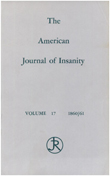Placebo-controlled trial of fluoxetine as an adjunct to relapse prevention in alcoholics
Abstract
OBJECTIVE: The authors tested the hypothesis that fluoxetine, when used in combination with relapse prevention psychotherapy, directly reduces relapse frequency and severity for alcoholics. METHOD: The authors conducted a randomized, placebo-controlled trial of fluoxetine (up to a maximum of 60 mg/day) for 12 weeks in combination with weekly psychotherapy for 101 alcohol-dependent subjects who were not selected on the basis of comorbid major depression. Outcomes were measured at the end of treatment and 6 months after treatment. RESULTS: Placebo- treated subjects were more complaint with the medication regimen and remained in the study longer than fluoxetine-treated subjects. There was significantly less alcohol consumption in both groups during treatment than before treatment. These effects persisted during the posttreatment period. Although fluoxetine treatment had no significant effects on alcohol consumption, it reduced Hamilton Depression Rating Scale scores more than placebo treatment among subjects with current major depression. CONCLUSIONS: Fluoxetine at a dose of 60 mg/day is probably not of use for relapse prevention in alcoholics with mild to moderate alcohol dependence and no comorbid depression. In alcoholics with major depression, the drug may reduce depressive symptoms. Subsequent studies with fluoxetine should probably focus on more severely alcohol-dependent subjects or those with comorbid depression.
Access content
To read the fulltext, please use one of the options below to sign in or purchase access.- Personal login
- Institutional Login
- Sign in via OpenAthens
- Register for access
-
Please login/register if you wish to pair your device and check access availability.
Not a subscriber?
PsychiatryOnline subscription options offer access to the DSM-5 library, books, journals, CME, and patient resources. This all-in-one virtual library provides psychiatrists and mental health professionals with key resources for diagnosis, treatment, research, and professional development.
Need more help? PsychiatryOnline Customer Service may be reached by emailing [email protected] or by calling 800-368-5777 (in the U.S.) or 703-907-7322 (outside the U.S.).



